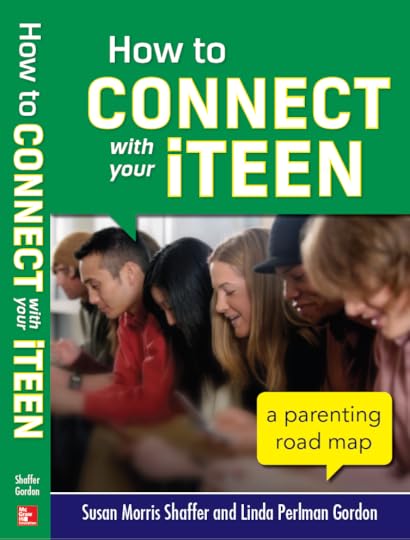Linda Perlman Gordon's Blog
April 8, 2015
Make stress work for you!
Changing how you think about stress can make you healthier.
In her TED Talk, Kelly McGonigal states that when you change how you feel about stress, you actually change your body’s response to it.
Reframing stress as something that is not harmful has a protective factor because you may be able to see your rapid heart rate and nervous reaction as energizing and positive.The reframe is, “My body is helping me succeed," as opposed to, “Oh no, I’m falling apart.” Creating meaning for discomfort can be protective!
Kelly's message comforts those who can't eliminate the stress in their lives and want to find a way to make it work to their advantage.

In her TED Talk, Kelly McGonigal states that when you change how you feel about stress, you actually change your body’s response to it.
Reframing stress as something that is not harmful has a protective factor because you may be able to see your rapid heart rate and nervous reaction as energizing and positive.The reframe is, “My body is helping me succeed," as opposed to, “Oh no, I’m falling apart.” Creating meaning for discomfort can be protective!
Kelly's message comforts those who can't eliminate the stress in their lives and want to find a way to make it work to their advantage.

Published on April 08, 2015 16:00
March 24, 2015
Embracing Vulnerability
 We can't access empathy when we refuse to allow ourselves to feel vulnerable.
We can't access empathy when we refuse to allow ourselves to feel vulnerable.
Watch Brene Brown talk about vulnerability.Well worth five minutes!
Published on March 24, 2015 15:23
March 23, 2015
The hands-on guide to communicate and develop a solid bond with your teen.
I've created a Facebook Page to post informative and interesting articles on parenting. Please click on Parenting Roadmaps and click LIKE to have access to all the current articles.
I'm promoting, with my co-author Susan Shaffer, our newest book which is being released in may 2015.

Bullying, gangs, social media, smartphones, reality TV . . .
The hands-on guide you need to communicate and develop a solid bond with your teen.
In the past, parents could block the threats of the outside world by merely closing their front door and turning off the TV. Now, your home is penetrable thanks to social media and cellphones, and drugs are easier to get than ever.
How to Connect with Your iTeen helps you re-open the lines of communication with "silent" teenage boys and cut through the drama of teenage girls. The authors provide education and coping skills for navigating the everything from socially complex issues concerning sexting and bullying to mundane challenges like school and homework.
I'm promoting, with my co-author Susan Shaffer, our newest book which is being released in may 2015.

Bullying, gangs, social media, smartphones, reality TV . . .
The hands-on guide you need to communicate and develop a solid bond with your teen.
In the past, parents could block the threats of the outside world by merely closing their front door and turning off the TV. Now, your home is penetrable thanks to social media and cellphones, and drugs are easier to get than ever.
How to Connect with Your iTeen helps you re-open the lines of communication with "silent" teenage boys and cut through the drama of teenage girls. The authors provide education and coping skills for navigating the everything from socially complex issues concerning sexting and bullying to mundane challenges like school and homework.
Published on March 23, 2015 16:30
March 18, 2015
New resouce for parents of teens
It's official. The publications date of our new book on iTeens is May 15.
 How to Connect with Your iTeen: Susan Morris Shaffer and Linda Perlman Gordon
How to Connect with Your iTeen: Susan Morris Shaffer and Linda Perlman Gordon
Bullying, gangs, social media, smartphones, reality TV . . .
The hands-on guide you need to communicate and develop a solid bond with your teen.
In the past, parents could block the threats of the outside world by merely closing their front door and turning off the TV. Now, your home is penetrable thanks to social media and cellphones, and drugs are easier to get than ever.
How to Connect with Your iTeen helps you re-open the lines of communication with "silent" teenage boys and cut through the drama of teenage girls. The authors provide education and coping skills for navigating the everything from socially complex issues concerning sexting and bullying to mundane challenges like school and homework
 How to Connect with Your iTeen: Susan Morris Shaffer and Linda Perlman Gordon
How to Connect with Your iTeen: Susan Morris Shaffer and Linda Perlman Gordon
Bullying, gangs, social media, smartphones, reality TV . . .
The hands-on guide you need to communicate and develop a solid bond with your teen.
In the past, parents could block the threats of the outside world by merely closing their front door and turning off the TV. Now, your home is penetrable thanks to social media and cellphones, and drugs are easier to get than ever.
How to Connect with Your iTeen helps you re-open the lines of communication with "silent" teenage boys and cut through the drama of teenage girls. The authors provide education and coping skills for navigating the everything from socially complex issues concerning sexting and bullying to mundane challenges like school and homework
Published on March 18, 2015 10:46
Do We Engage in Fear Based Parenting?
According to David Finkelhor at the Crimes Against Children's Research Center, abductions by strangers are down 51% since 1997 yet only 13% of school aged children walk or bike to school compared to 48% in 1969.
Childhood is now a danger free zone, with kids bubble wrapped to keep them perennially safe. While we think we can shield our kids from imagined danger, we often ignore the fact that via the internet, our homes now bring the outside inside.
It may be time to realistically assess what threatens our children. Is it the unaccompanied ride or walk to a friends house or the time spent trolling the information highway for mind numbing hours.
 Read about the five myths about missing children, in the Washington Post Article by David Finkelhor. The ubiquitous mantra, NEVER TALK TO STRANGERS isn't the answer. It is better to teach our children to discern the signs of the inappropriate stranger.
Read about the five myths about missing children, in the Washington Post Article by David Finkelhor. The ubiquitous mantra, NEVER TALK TO STRANGERS isn't the answer. It is better to teach our children to discern the signs of the inappropriate stranger.
Childhood is now a danger free zone, with kids bubble wrapped to keep them perennially safe. While we think we can shield our kids from imagined danger, we often ignore the fact that via the internet, our homes now bring the outside inside.
It may be time to realistically assess what threatens our children. Is it the unaccompanied ride or walk to a friends house or the time spent trolling the information highway for mind numbing hours.
 Read about the five myths about missing children, in the Washington Post Article by David Finkelhor. The ubiquitous mantra, NEVER TALK TO STRANGERS isn't the answer. It is better to teach our children to discern the signs of the inappropriate stranger.
Read about the five myths about missing children, in the Washington Post Article by David Finkelhor. The ubiquitous mantra, NEVER TALK TO STRANGERS isn't the answer. It is better to teach our children to discern the signs of the inappropriate stranger.
Published on March 18, 2015 10:30
December 3, 2014
New study says: Meditation is a powerful tool to manage symptoms of depression
The concrete physical health benefits of mediation and mindfulness are being studied by many scientists. Carolyn Gregoire reported the findings of a study completed in Sweden in The Huffington Post. It included over 200 patients and compared the effectiveness of two interventions, individual CBT (cognitive behavioral therapy) and mindfulness training. The study found that mindfulness training can be as effective as traditional forms of therapy in managing the symptoms of anxiety and depression. The reduction in participants' symptoms may be due to real changes in the brain.
Mindfulness is free and available to everyone, however while many people have good intentions and want to meditate, they just don't get around to it. So, fortunately or unfortunately therapists will remain busy even after they educate their patients about the power of meditation.

Mindfulness is free and available to everyone, however while many people have good intentions and want to meditate, they just don't get around to it. So, fortunately or unfortunately therapists will remain busy even after they educate their patients about the power of meditation.

Published on December 03, 2014 13:33
November 3, 2014
A.D.H.D, New Research and the Implications
In his article for the
New York Times,
Dr. Richard Friedman cautions parents to refrain from squashing the enthusiasm, creativity and curiosity of children identified with ADHD. New research has found that ADHD kids as well as adults are hard-wired to seek novel and exciting experiences due to a less sensitive reward circuit in their brains.
Knowledge is power. Translated for the parents of ADHD children, this means providing stimulating activities that will trigger their children's interests as well as finding an environment that celebrates their strengths. Because most structured environments label ADHD as a liability, parents can help their kids see it as an asset; and help them envision a future where they can thrive.

Knowledge is power. Translated for the parents of ADHD children, this means providing stimulating activities that will trigger their children's interests as well as finding an environment that celebrates their strengths. Because most structured environments label ADHD as a liability, parents can help their kids see it as an asset; and help them envision a future where they can thrive.

Published on November 03, 2014 14:45
September 15, 2014
The Marshmallow Test's predictive value.
Many of us know about the marshmallow test, the famous test invented 50 years ago to identify which children had self control. Five-year-olds were given a marshmallow and told that if they could resist eating it for 15 minutes, they could get 2 marshmallows instead of just one.
The results had real predictive value. Those children who waited coped better with stress and were generally more successful than the ones who didn't wait.
We often equated the test with destiny. However, those analyzing the results neglected to consider our ability to intervene and teach self control to those kids who weren't able to rely gratification for 15 minutes. The test could be used to demonstrate to parents which child could benefit from exercises to increase his self control.
In her Op-Ed for the New York Times , Pamela Druckerman interviews the author of the Marshmallow test, psychology professor, Walter Mischel. He discovered the technique used by the successful students was DISTRACTION. Instead of fixating on the marshmallow, they concentrated on something else. Learning to distract oneself is something we can all teach our children.
In this day of instant gratification, the ability to teach our children self control is a tool that will help them reach their goals and have less distress coping with frustration. Powerful yet simple!

The results had real predictive value. Those children who waited coped better with stress and were generally more successful than the ones who didn't wait.
We often equated the test with destiny. However, those analyzing the results neglected to consider our ability to intervene and teach self control to those kids who weren't able to rely gratification for 15 minutes. The test could be used to demonstrate to parents which child could benefit from exercises to increase his self control.
In her Op-Ed for the New York Times , Pamela Druckerman interviews the author of the Marshmallow test, psychology professor, Walter Mischel. He discovered the technique used by the successful students was DISTRACTION. Instead of fixating on the marshmallow, they concentrated on something else. Learning to distract oneself is something we can all teach our children.
In this day of instant gratification, the ability to teach our children self control is a tool that will help them reach their goals and have less distress coping with frustration. Powerful yet simple!

Published on September 15, 2014 12:45
September 3, 2014
Parenting and Cell Phones- are they compatible?
Most parents struggle with the boundaries around screen time for their children, usually because they struggle with it themselves. Jordan Shapiro writes about the confusion in his article, The Truth About Parenting And Smartphones, for Forbes Magazine. He disagrees with the notion that smartphone use leads to bad parenting.
There is no getting away from cell phones and tablets. We live in a wired world with data seeping through our hands and homes. There is no putting the technology genie back in the bottle. What's a parent to do absent of clear information of how much constitutes too much interaction with screens?
The ability to be a good or better parent still belongs to the individual parent and his/her sense of what feels right. Technology will not rob you of this. The antidote to excessive screen use is good boundaries and balance. Figure out what works for you and your family, implement it and stick to it!

There is no getting away from cell phones and tablets. We live in a wired world with data seeping through our hands and homes. There is no putting the technology genie back in the bottle. What's a parent to do absent of clear information of how much constitutes too much interaction with screens?
The ability to be a good or better parent still belongs to the individual parent and his/her sense of what feels right. Technology will not rob you of this. The antidote to excessive screen use is good boundaries and balance. Figure out what works for you and your family, implement it and stick to it!

Published on September 03, 2014 09:38
July 14, 2014
How Can a Parent Foster Empathy?
The term "Emotional Intelligence" became widely-known with the publication of Dr. Daniel Goleman's book, Emotional Intelligence - Why it can matter more than IQ in 1996. Since then it has had a meteoric rise in importance because it is associated with good mental health and leadership skills. Put simply, people with emotional intelligence have both the ability to differentiate between different emotions and the ability to label their feelings.
In the Huffington Post, author, Devishobha Ramanan identifies easy ways for parents to foster empathy, a critical component of
emotional intelligence, in children.

In the Huffington Post, author, Devishobha Ramanan identifies easy ways for parents to foster empathy, a critical component of
emotional intelligence, in children.

Published on July 14, 2014 15:19



